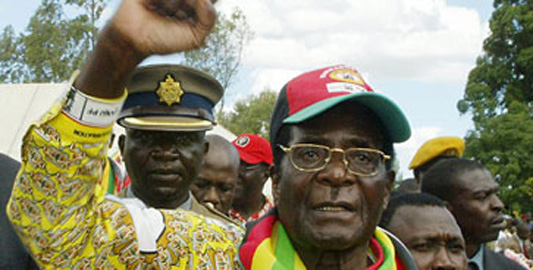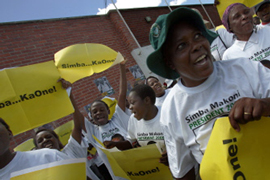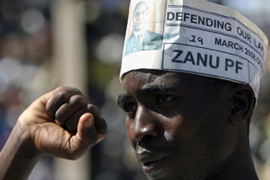Mugabe seeks win at all costs
The Zimbabwean president has increased salaries in a bid to get re-elected.

 |
| Robert Mugabe, leader of the ruling party in Zimbabwe, faces a decline in popularity on the eve of general elections [AFP] |
Amid a deepening economic crisis worsened by runaway inflation, Zimbabweans go to the polls on Saturday to choose a new president.
But there are concerns on whether the poll will be free and fair.
Robert Mugabe, the 84-year-old Zimbabwean president seeking re-election, has told opposition politicians that as long as he is “still alive”, they will never lead the country.
| even if Mugabe rigs, it will be hard for him to win” |
Many analysts view this as his readiness to resort to unfair means of winning the election. The last election in 2002 was rigged, according to election observers. Mugabe has since become a pariah, attracting international condemnation and sanctions over his style of leadership.
But this year, the former freedom fighter is facing the biggest challenge ever to his 28-year rule from Morgan Tsvangirai, leader of the opposition Movement for Democratic Change (MDC).
Tsvangirai has been addressing tens of thousands of supporters at his rallies – bigger numbers than those at Mugabe’s rallies and Simba Makoni’s, Mugabe’s former finance minister, who is an independent candidate.
Waning popularity
Analysts say that this is a sign that Mugabe’s popularity, such as it is, is waning, and an indication that he could lose the election.
 |
| Supporters of opposition candidate Simba Makoni sing and dance in Harare [AFP] |
Five million voters are expected to cast their ballots in a country with a population of 13 million, and 8,998 polling stations have been designated by the Zimbabwe Electoral Commission.
An acute shortage of basic commodities ranging from sugar to bread to fuel – and inflation running at 100,000 per cent a year, which has rendered the Zimbabwean dollar almost worthless – have left many voters angry and frustrated.
Many look to the opposition as the real hope for change in a country where eight in 10 people are out of work.
Hoping to increase his standing in the polls, Mugabe has in the weeks running up to the elections increased civil servants’ salaries and doled out 500 vehicles, generators and TVs, a move widely seen by independent observers as a “vote buying” strategy.
Concerns have also been voiced by Human Rights Watch (HRW), which has documented human rights abuses in Zimbabwe over the years, saying that the government has intimidated opposition supporters.
Commission under fire
The electoral commission, headed by George Chiweshe, a Mugabe appointee, has been accused of gerrymandering of constituencies, giving rural areas, where Mugabe has strong support, a large number of seats.
| In depth | |
Profiles |
“We did a constituency profile and found out there were more voters in rural areas than in urban ones,” Rindai Chipfunde-Vava, executive director of the Zimbabwe Election Support Network (ZESN), told Al Jazeera, without corroborating gerrymandering claims.
“We have also heard complaints about the chairperson of the commission and our view is that the president [Mugabe] should have nominated someone in consultation with all political parties.”
Government officials dismiss any allegations of premeditated rigging and have said that the electoral commission consists of members of both the governing Zanu-PF and those of the MDC.
But there is talk of disenfranchising voters in areas viewed to be strongholds of the opposition by distributing fewer ballots than the number of voters on the register.
Dead voters arise
The register is also said to bear names of dead voters. “Some of the names do not exist,” Theresa Makone of the MDC told Al Jazeera.
 |
| A Mugabe supporter attends a rally in Bulawayo on March 23, 2008 [AFP] |
“If the names existed, the people would be seen. Obviously they are fictitious. I wouldn’t be surprised if all those names belong to dead people.”
The opposition’s other hurdle is that security organs seem to be all behind Mugabe, and are ready to do his bidding. Augustine Chihuri, Zimbabwe’s police chief, warned recently that the police would not let opposition “puppets” take power, and that Mugabe’s land redistribution policy would not be reversed.
The police have gained notoriety for cracking down on the opposition since the controversial land redistribution policy began in 2000.
Last year several leading opposition figures, including Tsvangirai and Nelson Chamisa, an MDC member of parliament, were badly beaten for holding rallies and ended up in hospital.
Mugabe was later to brag at a Zanu-PF rally: “Of course he [opposition leader Morgan Tsvangirai] was bashed. He deserved it … I told the police to beat him a lot. He and his MDC must stop their terrorist activities. We are saying to him, ‘Stop it now or you will regret it.'”
Fears of rigging
Without independent election observers and monitors from the European Union and the Commonwealth, the opposition fears that Mugabe may rig on a bigger scale than he did in 2002.
Zimbabwe has no independent media, having shut down privately owned newspapers like the Daily News, which the government often accused of being critical and biased. Television is state-owned and broadcats of private radio stations are jammed.
Steven Gruzd, who works for the South African Institute of International Affairs (SIIA), an influential think tank in southern Africa, said the opposition has been aware of the possibility that the election could be rigged.
“But they think that the vote against Mugabe will be so overwhelming that even if Mugabe rigs, it will be hard for him to win,” he added.
That only remains to be seen given the fact that Mugabe has already “bought” many voters.
Seasoned watchers say that Mugabe fears that if he is not re-elected, and leaves power, the International Criminal Court (ICC) might indict him for the alleged atrocities he committed in Matebeleland in the early 1980s.
